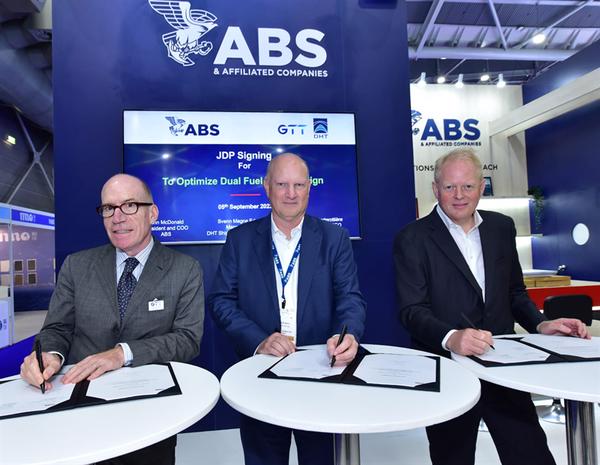ABS, GTT and DHT partner to upgrade LNG-powered VLCC design
Classification society ABS, French containment system builder GTT and oil tanker company DHT Holdings (DHT) have agreed to enhance the design of an LNG dual-fuel very large crude carrier (VLCC) to meet regulatory requirements such as carbon intensity indicator (CII).
 PHOTO: GTT’s chief executive and chairman Philippe Berterottière, ABS’ president & chief operating officer John McDonald and DHT Ship Management’s managing director Svenn Magne Edvardsen at the deal signing (left to right). ABS
PHOTO: GTT’s chief executive and chairman Philippe Berterottière, ABS’ president & chief operating officer John McDonald and DHT Ship Management’s managing director Svenn Magne Edvardsen at the deal signing (left to right). ABS
The announcement came at the Gastech 2023 event taking place in Singapore this week.
Under the agreement, the companies will “focus on optimizing the VLCC design, exploring the total cost of operation by analyzing the operating profile and fuel availability at frequently visited ports,” ABS said.
The trio will also collaborate on issues including “LNG fuel volume, tank size optimization and impact on regulatory measures such as carbon intensity indicator (CII),” ABS added.
CII is a measure of how efficiently a ship transports goods or passengers. It is expressed in grams of CO2 emitted per mt of cargo and nautical mile. The ship is then rated every year from A to E (A being the highest). The rating criteria will become stricter by 2030.
The International Maritime Organisation's (IMO) CII regulation is applicable for all cargo, RoPax and cruise vessels above 5,000 gross tonnage (GT) from January this year.
“LNG has significant potential to improve the emissions performance of vessels, including VLCCs. Flexibility afforded by dual fuel operations combined with the potential for improved CII rating may well contribute to a longer lifespan and increase appeal to charterers,” ABS’ president and chief operating officer John McDonald said.
LNG can curb carbon dioxide emissions by about a quarter compared to conventional bunker fuels. But its methane emissions can be 36 times more potent as a greenhouse gas (GHG) compared to carbon dioxide over a century, according to a World Bank study.
By Tuhin Roy
Please get in touch with comments or additional info to news@engine.online






